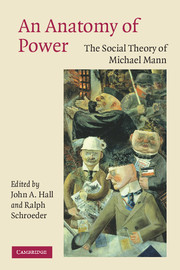Book contents
- Frontmatter
- Contents
- List of figures
- List of contributors
- 1 Introduction: the IEMP model and its critics
- Part I Theory, practice, method
- Part II Types of power
- 6 Mann's theory of ideological power: sources, applications and elaborations
- 7 Political power un-manned: a defence of the Holy Trinity from Mann's military attack
- 8 Mann, the state and war
- 9 Infrastructural power, economic transformation, and globalization
- Part III European exceptionalism?
- Part IV Promise and perils of modernity
- Part V Response
- Bibliography of Michael Mann's Writings
- Index
- References
7 - Political power un-manned: a defence of the Holy Trinity from Mann's military attack
Published online by Cambridge University Press: 22 September 2009
- Frontmatter
- Contents
- List of figures
- List of contributors
- 1 Introduction: the IEMP model and its critics
- Part I Theory, practice, method
- Part II Types of power
- 6 Mann's theory of ideological power: sources, applications and elaborations
- 7 Political power un-manned: a defence of the Holy Trinity from Mann's military attack
- 8 Mann, the state and war
- 9 Infrastructural power, economic transformation, and globalization
- Part III European exceptionalism?
- Part IV Promise and perils of modernity
- Part V Response
- Bibliography of Michael Mann's Writings
- Index
- References
Summary
This brief contribution addresses only one of the problems raised by Michael Mann's imaginative and substantial discussion of the military phenomenon in his magnum opus (Mann 1986; 1993). The problem concerns the conceptual status Mann confers upon that phenomenon by considering it as the locus of a distinctive, relatively self-standing source of social power, on which it falls occasionally to play an autonomous role in the making and unmaking of societies, and which in any case interacts with the other sources as the custodian of a resource – organized coercion – which they don't control while it does.
Put otherwise, I question, below, Mann's decision to stage his show with four protagonists – IEMP – rather than with the usual trinity of political, economic and ideological power. In doing so, he expressly and, one might say, gleefully sets himself against the trinitarian orthodoxy. I contend that, on purely conceptual grounds, this a doubtful decision, though I concede that it has occasionally some justification in specific empirical circumstances.
In making that decision, I believe, Mann was carried away by the intensity of his reaction against the social theorizing prevalent at the time he conceived and planned Sources of Social Power, for there the military phenomenon was sometimes ignored, more frequently treated diffidently and without an adequate sense of its nature and significance.
- Type
- Chapter
- Information
- An Anatomy of PowerThe Social Theory of Michael Mann, pp. 135 - 149Publisher: Cambridge University PressPrint publication year: 2006
References
- 5
- Cited by



